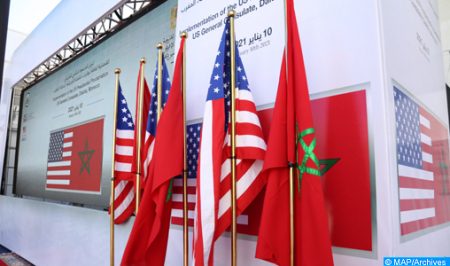US Experts Highlight Relevance of US Proclamation on Moroccan Sahara
US experts in law and international relations on Wednesday underlined the relevance of the US Proclamation on the Moroccan Sahara, noting that support for autonomy under Moroccan sovereignty has been for a long time supported by several US administrations. Speaking at a virtual conference organized by the New York City Bar Association (NYCBAR) on this subject, Elliott Abrams, former senior US diplomat and Assistant National Security Advisor to the White House (2005- 2009), pointed out that the current American administration should maintain and endorse the Proclamation adopted by its predecessor, given that the Kingdom of Morocco is “a long-standing loyal strategic ally” of the United States of America. Abrams, who is also a specialist in the Middle-East affairs at the prestigious US Think Tank “Council on Foreign Relations”, shed light on the role of Algeria in the perpetuation of the regional dispute over the Moroccan Sahara, noting that in the absence of “the blatant Algerian support for the Polisario, this conflict would have ended a long time ago within the framework of the Moroccan autonomy plan. For Algeria, he said, the Sahara issue is no more than an instrument to undermine Morocco, and its support for the Polisario separatists perfectly fits into this scenario. Unlike Morocco, Algeria has no national interest in the Sahara issue, in the sense that the Algerian power is instrumentalizing the Polisario as part of its hegemonic rivalry for the Kingdom, he noted. Elliott Abrams also recalled that the region of the Sahara has never historically been an independent state, and that the fact of wanting to cut it off from the Kingdom of Morocco, as defended by some, would destabilize a historical ally of the United States and would contribute to instability in a region already plagued by insecurity. Abrams underlined, in this regard, that it is very difficult to conceive that an autocratic separatist movement like the Polisario can lead to a democratic State, as some argue. According to him, it is therefore in the interest of the United States to oppose any attack on the territorial integrity of the Kingdom of Morocco. For his part, Eugene Kontorovich, professor and director of the Center for the Middle East and International Law at George Mason University, said that the United States of America continues to recognize at this very moment the sovereignty of Morocco over the Sahara, and that it is currently the US policy on this issue. President Joe Biden “does not need to endorse” the Proclamation adopted by his predecessor, in the sense that he is “himself the current President of a country which already recognizes this sovereignty,” the expert pointed out. Professor Kontorovich also underlined that the US policy on the Moroccan Sahara “remains consistent with international law”, recalling that a large and increasing number of Arab and African countries have recently opened Consulates in the Sahara as a sign of full recognition of the entire sovereignty of the Kingdom of Morocco over this region. The two American experts have challenged the biased theses put forward by the other panelists participating in this conference, in particular John Bolton and Christopher Ross, whose strong positions in favor of the enemies of the territorial integrity of the Kingdom are known to all.

